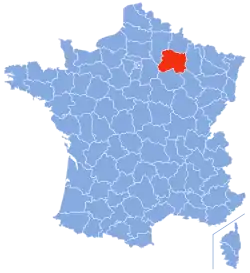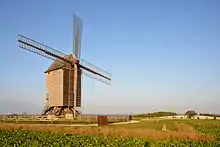Marne (department)
Marne (French pronunciation: [maʁn]) is a department in the Grand Est region of France. It is named after the river Marne which flows through it. The prefecture (capital) of Marne is Châlons-en-Champagne (formerly known as Châlons-sur-Marne). The subprefectures are Épernay, Reims, and Vitry-le-François.
Marne | |
|---|---|
.jpg.webp) Prefecture building of the Marne department, in Châlons-en-Champagne | |
 Flag  Coat of arms | |
 Location of Marne in France | |
| Coordinates: 49°00′N 04°15′E | |
| Country | France |
| Region | Grand Est |
| Prefecture | Châlons-en-Champagne |
| Subprefectures | Épernay Reims Vitry-le-François |
| Government | |
| • President of the General Council | René-Paul Savary |
| Area | |
| • Total | 8,162 km2 (3,151 sq mi) |
| Population (2016) | |
| • Total | 570,883 |
| • Rank | 45th |
| • Density | 70/km2 (180/sq mi) |
| Time zone | UTC+1 (CET) |
| • Summer (DST) | UTC+2 (CEST) |
| Department number | 51 |
| Arrondissements | 4 |
| Cantons | 23 |
| Communes | 613 |
| ^1 French Land Register data, which exclude estuaries, and lakes, ponds, and glaciers larger than 1 km2 | |
The Champagne vineyards producing the world-famous sparkling wine are located within Marne.
Name
The department is named after the Marne, which was called Matrona in Roman times.
History
Marne is one of the original 83 departments created during the French Revolution on March 4, 1790. It was created from the province of Champagne.
Marne has a long association with the French Army. The training ground of the Camp Militaire de Mailly straddles the border with the département of Aube in the south while that of the Camp de Mourmelon occupies a large area north of Châlons-en-Champagne. The smaller Camp de Moronvilliers lies to the east of Reims and the Camp Militaire de Suippes lies to the east of that. These are all on the chalk of the Champagne plateau, a feature comparable in geology but not size, with the British military training ground on Salisbury Plain.
Geography
Marne is part of the region of Grand Est and is surrounded by the departments of Ardennes, Meuse, Haute-Marne, Aube, Seine-et-Marne, and Aisne.
Geologically, it divides into two distinct parts; the Upper Cretaceous chalk plain in the east and the more wooded and hilly Eocene and Oligocene in the west.
Rivers draining the department include the Marne, Vesle, Ardre and Somme-Soude. Numerous other rivers, such as the Grande and the Petite Morin rise in the department but flow mainly in others. Conversely, the Aube joins the Seine in the department of Marne.
Demographics
The inhabitants of the department are called Marnais.
Population development since 1801:
| Year | Pop. | ±% p.a. |
|---|---|---|
| 1801 | 304,651 | — |
| 1806 | 311,017 | +0.41% |
| 1821 | 307,644 | −0.07% |
| 1831 | 337,076 | +0.92% |
| 1841 | 356,632 | +0.57% |
| 1851 | 373,302 | +0.46% |
| 1861 | 385,498 | +0.32% |
| 1872 | 386,157 | +0.02% |
| 1881 | 421,800 | +0.99% |
| 1891 | 434,734 | +0.30% |
| 1901 | 432,882 | −0.04% |
| 1911 | 436,310 | +0.08% |
| 1921 | 366,734 | −1.72% |
| 1931 | 412,156 | +1.17% |
| 1936 | 410,238 | −0.09% |
| 1946 | 386,926 | −0.58% |
| 1954 | 415,141 | +0.88% |
| 1962 | 442,135 | +0.79% |
| 1968 | 485,388 | +1.57% |
| 1975 | 530,399 | +1.27% |
| 1982 | 543,627 | +0.35% |
| 1990 | 558,217 | +0.33% |
| 1999 | 565,229 | +0.14% |
| 2006 | 565,841 | +0.02% |
| 2011 | 566,571 | +0.03% |
| 2016 | 570,883 | +0.15% |
| source:[1] | ||
Politics
Current National Assembly Representatives
Tourism
Reims, with its famous cathedral in which the kings of France were traditionally crowned, is a major attraction. Other branches of tourism are provided by the bird reserve on the Lake Der-Chantecoq and the fishing lakes nearby. The Parc Naturel Régional de la Montagne de Reims is a major area of country recreation. In the west of the département there are many scenic routes to be explored as also are the several wine cellars of Épernay.
_(9292412785).jpg.webp)

 Vineyards near Épernay
Vineyards near Épernay Champagne bottles
Champagne bottles
 Notre-Dame-en-Vaux collegiate church in Châlons-en-Champagne
Notre-Dame-en-Vaux collegiate church in Châlons-en-Champagne
See also
References
External links
| Wikisource has the text of a 1911 Encyclopædia Britannica article about Marne. |
- (in French) Prefecture website
- (in French) General Council website
- (in English) Marne at Curlie
- (in English and French) Official Tourist Board